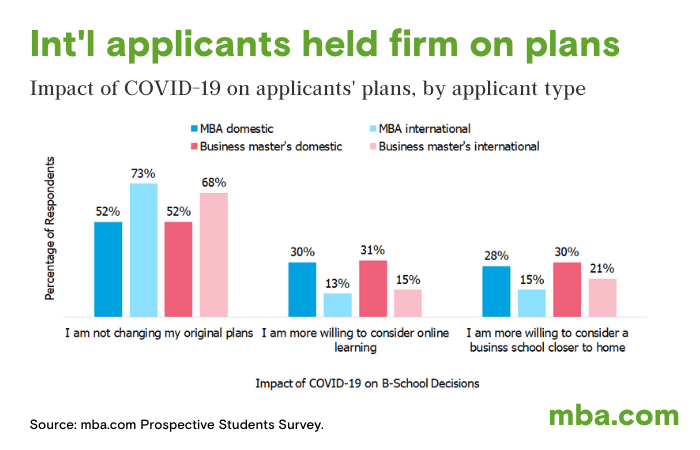Business School Admissions 2021: 4 Big Trends in the Data

The 2021 business school admissions cycle has certainly been one for the history books. Taking place entirely during a global pandemic, the business school admissions process was turned on its head. MBA and business master’s programs, their admissions staff, and applicants all demonstrated tremendous adaptability, shifting operations online to keep all involved safe while keeping candidates’ enrollment plans on track for a 2021 start.
While we’ll need to wait until this fall’s annual Application Trends Survey to see if this cycle’s application volumes topped the boom in applications seen the previous cycle, a new report out from GMAC Research explores six months’ worth of data collected from mba.com registrants and reveals the key trends that have shaped their diverse journeys to business school during unusual times.
Here’s our summary of four big trends in the numbers:
1. Applicants’ COVID-19 concerns diminished over time
The report specifically looks at survey data collected between July and December 2020 from mba.com registrants who indicated plans to enroll in a graduate business school program in 2021. Of course, this period saw unprecedented restrictions on movement and social distancing protocols.
What the data show is that over time, applicants eyeing 2021 enrollment in business school expressed diminishing levels of concern about how COVID-19 may impact their future education. The proportion of respondents reporting that they were extremely or very concerned declined from 41 percent in July to 33 percent in December.

2. International applicants remained committed to their business school and mobility goals
Unsurprisingly, international candidates reported a higher level of concern about COVID-19 than domestic candidates, due to continued travel, visa, and safety constraints.
Specifically, 41 percent of international candidates pursuing a business master’s and 39 percent pursuing an MBA report that they are very or extremely concerned about the impact of COVID-19, compared to 27 percent of domestic candidates.
Despite this, international applicants were more likely to report that they are not changing their original plans (70%) than domestic candidates (52%). More specifically, international MBA applicants were less likely to say they are willing to consider business school options closer to home (15% vs 28%) and less likely to say they are willing to consider online learning (13% vs 30%).

What’s driving international applicants’ commitment to their business school plans? The data reflect how their mobility goals, specifically to live and work outside their country of citizenship post-business school, are the most commonly cited career-related goals among international applicants. For domestic candidates, other career advancement goals, like earning a higher salary or obtaining a senior level position take precedence.
Where in the world are these international applicants aiming to study? The report finds that the United States and United Kingdom remain the top choices.
Read our recent coverage of what the Biden administration could mean for international MBA candidates and why the United Kingdom remains an attractive option for international MBAs despite Brexit.
3. Women turned to online learning opportunities in the face of the “shecession”
It’s been widely shown that the impact of COVID-19 has been more acutely felt by women, as they have shouldered more of the responsibilities of remote education and work compared with their male counterparts and have experienced greater job and incomes losses.
Amidst this “shecession,” the data show female applicants for 2021 are overall more likely to seek the flexibility of online learning.
Among domestic MBA applicants, for example, women were more willing to accept completing 30 percent of their degree online due to COVID-19 (60% vs 52% among men) and less likely to disagree that the career opportunities gained through an on-campus graduate business degree are the same as those gained through an online degree (17% vs 24%).
Read more about women’s growing representation in business school, how MBA women support one another, and MBA scholarships for women.
4. Domestic applicants are headed to business school to gain the skills to be hirable in a competitive market
While more than half of applicants (58%) confirmed that they “always plan to pursue a graduate business degree at this point,” over a third (37%) said that they are going to business school now because they “want to apply for a job but lack required skills and/or degree to be competitive.”
Overall, domestic MBA applicants were more likely to express this than international MBA applicants (39% vs 33%), and the difference was even more pronounced among business master’s applicants (50% vs 36%).
The accelerated demand for GME may be a result of the fact that more candidates recognize the need to emerge out of a shaky economy more career ready.
It’s not too late to start business school in 2021
Many of the world’s leading business schools are still accepting applications for fall 2021! Now’s the time to spring into action if you want 2021 to be the year you took your career to the next level by starting an MBA or business master’s program.
Our Ultimate Business School Admissions Checklist is exactly what you need to make sure you hit all the key steps to putting together a winning application. Download your free copy today!



